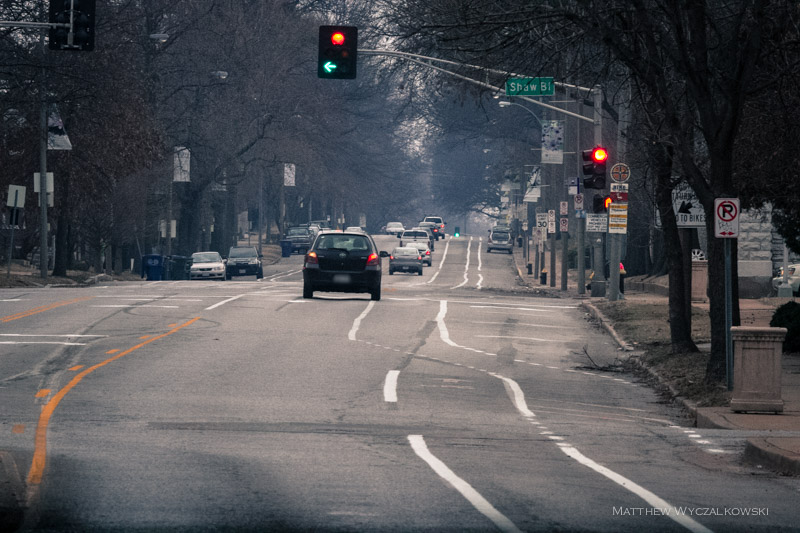I am a native St. Louisan, raised in South St. Louis County and an outspoken city resident for the past 8 years. I have lived in Oakville, in Columbia [MO], and in the city-neighborhoods of Clayton-Tamm and Forest Park Southeast. I have lived without a vehicle in two of those places. While it may not surprise many to know that a college town in the middle of Missouri is more accessible to the car-less citizen than our beloved 18th-century city on the banks of the Mississippi, it probably should. Really, it should concern us. St. Louis, a city that developed along its streetcar lines, has succomed (as most American cities have) to the automobile and everything that comes with it. This is a reality only truly understood when lived, as so many of our area’s residents do every day.
My latest experience being car-less wasn’t anticipated or welcomed and was terribly-timed. The story began last November, when I quit my job to pursue a new startup full time. This is the second business I have started so I had at least an idea of the risk involved when I took the leap. With a couple of months-worth of money in the bank I planned to get the business off the ground and worry about the rest later. Then, a month later as perhaps a fitting close to the most-strained holiday season I can recall, the engine in my truck blew up on Christmas night. Given the situation I’d put myself in, I didn’t have an option other than move forward. Thankfully I had a decent bike to do it on.
In the past four months I have become a more conscience traveler – logistics of movement are something taken for granted with a working vehicle in a car city – between bike, bus, and train (and a borrowed vehicle here and there), getting around town has mostly been manageable. It has also, if I’m being honest, been a pain-in-the-ass at times and has led to a few cancelled meetings on account of weather or time-constraint. While biking has certainly been good for my physical health, being somewhat travel-restricted is probably not ideal for a startup co-founder and biking in January is definitely not that fun. Getting across the city as a single mother with two jobs is probably even less fun, but we’ll get to that.
Our startup community has recently been getting some national attention. Most of this press has identified St. Louis as a great place to start a company because of our affordable cost of living, i.e. cheap rent. There needs to be an asterisk however, indicating the near-requirement of vehicle ownership. In true car-culture fashion, the cost of transportation is externalized and true cost of living ignored. Riding Metro is cheap, if you can get to it, but owning a car – not so cheap. Yet this is the narrative St. Louis projects outward and how much of our development is marketed: it’s cheap to live here so all the young professionals and college grads will want to stay!
Though attracting new people is important as is retaining transplants who move here for college, we are missing the larger point in much of our discussion of where St. Louis is heading. If we are to sustain our recent growth within this community, we’ll need a new narrative. We should focus on the people who are here, rather than those who are not. Those for whom travelling across town is a daily inconvenience at best and a struggle at worst. Liveability and more specifically, equity, should be the beginning of every conversation about development, policy, and just about anything else talked about in City Hall or around our dinner tables. The cities we are trying to compete with aren’t top-tier cities because they had good marketing or cheap rent, they are liveable, walkable, bikeable cities that people want to live in.
If we move forward with equity in mind – racially, culturally, economically – we can capitalize on these current positive development trends and ensure that our startup boom becomes a long-term economic boon for everyone in our city. With many cities having the same conversations as we are today, it will be the cities who get these details right that are relevant in twenty years. Let’s make sure St. Louis gets it right. We can talk about the great things that are happening in our city, and those are good conversations to have, but we have to acknowledge the scope of work that remains. Our transit system is not bad for a midwestern city, but it sucks compared to a European one, or even a turn-of-the-century St. Louis one! We have expanded our bike and pedestrian infrastructure but many of our roadways remain expert-level Frogger challenges not for the faint of heart. It’s time to roll up our sleeves.
The past months have been instructive and even though I would prefer to have a working vehicle, I recognize that I’m prioritizing my new business above travel convenience, but not everyone gets to make that choice. Transportation shouldn’t be difficult for anyone in a modern city, with or without a car. I am confident that we can get this conversation right and become a world-class city for generations to come. St. Louis would finally be a liveable city for everyone and people will want to move here not for our cheap rent but because we are a model 21st century recovery city – a city that has scars and isn’t afraid to talk about them. We’ll recognize the lessons in our past and move forward together towards a better future for all.

